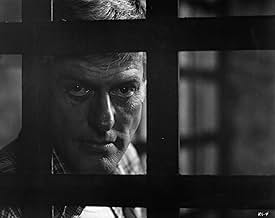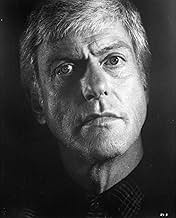Aggiungi una trama nella tua linguaFather Rivard is a priest in a small, economically depressed coal mining town. Working on what he thinks is a "controversial" work, he lives with the brutal lives of his poor parishioners, t... Leggi tuttoFather Rivard is a priest in a small, economically depressed coal mining town. Working on what he thinks is a "controversial" work, he lives with the brutal lives of his poor parishioners, the old, unfriendly nuns in the nearby convent, and his own self doubts.Father Rivard is a priest in a small, economically depressed coal mining town. Working on what he thinks is a "controversial" work, he lives with the brutal lives of his poor parishioners, the old, unfriendly nuns in the nearby convent, and his own self doubts.
- James
- (as Billy J. Jacoby)
- Sister Immaculata
- (as Sister Marguerite Morrissey)
- Sophie
- (as Katharine Kramer)
Recensioni in evidenza
Let's get the obvious out of the way: Kathleen Quinlan didn't act like a nun. When Julie Andrews had an outspoken tongue, love of children, and vivacious energy in The Sound of Music, the message was that she didn't belong in the convent. I can't imagine Kathleen making it through years of training with her full set of emotions and outgoing personality - and not getting kicked out of the order. However, since her personality was so contrary to most typical nuns, you can imagine what a breath of fresh air she was to her new community (and you can also understand why she was transferred). The children loved her and they learned more with her teaching styles, and the priest found new companionship and great conversations.
Even though you go through most of the movie thinking you know what happened, it's still very exciting. Because you don't know how it all unfolds, and you don't really know what happened. As Kathleen infects the town with optimism and inner cheer, Dick finds himself drawn to her in ways that priests shouldn't feel. They had wonderful chemistry together, and they both got to show acting talents normally hidden from audiences. Sneaking by on a technicality, the publicity poster stated that this was the first dramatic theatrical movie of Dick Van Dyke's; but television audiences could see the rare glorious treat in 1974 of The Morning After. I'm still trying to get my hands on a copy of The Country Girl (tv remake) to see more of Dick's dramatic talents; I can't wait!
I totally recommend this movie, whether you like mysteries or forbidden romances. It pre-dated the endlessly popular The Thornbirds miniseries, and while it might not make you go so far as to ask, "What was the big deal?" about Richard Chamberlain's struggle, it'll certainly make you see Dick Van Dyke differently. His screen persona didn't highlight sex appeal, but he was extremely convincing in this role. Can't imagine him being passionate? Rent this movie.
The movie is apparently based on a true story. While the love affair and subsequent trial are the main focus, the movie also seems to be dealing with - if subtly - discrimination towards Catholics in the United States in the early 20th century. The children who attend school in the church feel as if they live happy lives with the nuns and priest, but the trial allows the townspeople to be as hostile as they want towards the priest (and by extension, Catholics in general). The movie is sort of like Kramer's "Inherit the Wind" in that regard.
So anyway, "The Runner Stumbles" isn't any kind of masterpiece, but still a good look at discrimination, and the collapse of innocence that the church undergoes. A fine end for Stanley Kramer's career, and certainly good roles for Van Dyke and Quinlan. Also starring Maureen Stapleton, Tammy Grimes, Beau Bridges and Ray Bolger (the Scarecrow in "The Wizard of Oz").
Lo sapevi?
- QuizThe final feature film appearance by Ray Bolger.
I più visti
- How long is The Runner Stumbles?Powered by Alexa
Dettagli
Botteghino
- Budget
- 2.500.000 USD (previsto)
Contribuisci a questa pagina































